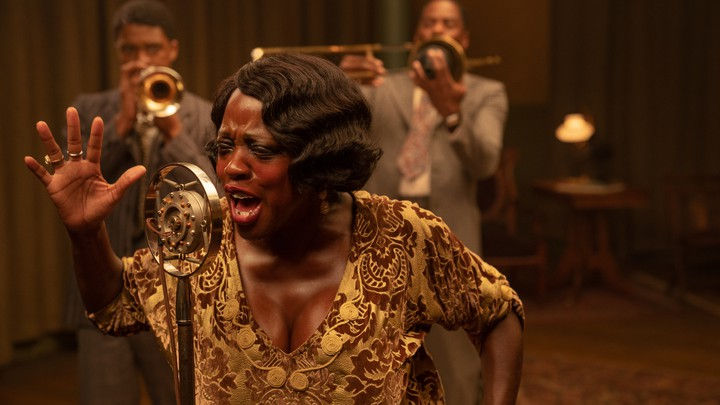Ma Rainey’s Black Bottom ★★★
- 2filmcritics

- Jan 6, 2021
- 3 min read
Availability: Streaming on Netflix only; for future availability, see JustWatch here.
Don’t step on my yellow shoes
The moral core is slow in coming in this film version of August Wilson's 1982 play, the first of his 10-play “Pittsburgh Cycle” about black life in America in the 20th century. Almost half of the 94-minute production is taken up with the banter, jiving and speechifying of Blues legend Ma Rainey’s back-up band members in the squalid basement practice room of a rundown Chicago recording studio in 1927. But when the morality tale arrives, it packs a wallop—indeed, more than one.
Youthful trumpeter Levee is a magnificent Chadwick Boseman in his last, and most complex, role.
Portrayed by Oscar winner Viola Davis (“Fences,” 2017, another adaptation of a Wilson play) with egotistical, flashy glory, Ma is both a parallel to and a diversion from the main character, youthful trumpeter Levee, a magnificent Chadwick Boseman in his last, and most complex, role. Boseman (“Marshall,” 2017, “Black Panther,” 2018, “Da 5 Bloods,” 2020), died in August.

Right, Boseman as trumpeter Levee, his last role.
Ma and Levee promote their own talents with self-confidence and hubris. As “the Mother of the Blues,” Ma has already made it; yet she knows she must use and leverage her talent, or she will be exploited: “All they want is my voice.” Levee dreams of forming his own band, writes his own songs, and revels in a newly purchased pair of yellow leather dress shoes that cost him a week’s pay; in his eyes, his future is glorious.
They both operate in a white world, where systemic racism can thwart all they seek to achieve.
But they both operate in a white world, where systemic racism (here’s the connection to current issues) can thwart all they seek to achieve. Ma’s solution is to be arrogant and domineering, to demand—before she records a single note—everything from a Coke to a voice role for her stuttering nephew Sylvester (Dusan Brown). Levee’s is to toy with the white man, to act as if he’s going along when his objective is to fool the man, echoing hard lessons taught by his once successful farmer father.

Left, Viola Davis as Ma Rainey
The older band members offer other routes to living black in a society shaped and controlled by whites. God-fearing band leader Cutler (Colman Domingo) wants calm and agreement. Aged pianist Toledo (Glynn Turman), the inarticulate philosopher, holds out hope for mass action, to have all “colored people”— “the colored man is the leftovers”—respond together, even though he can’t figure out what that response might be. In a particularly powerful scene, Levee—full of doubt about the role of God in the affairs of black men—challenges Cutler’s religious convictions.
The film suffers from its origins as a play.
The film suffers from its origins as a play, and from the theater backgrounds of both the director, George C. Wolfe, well-known for Broadway productions, and the writer of the adaptation, Ruben Santiago-Hudson. Mainly a TV actor and writer, Santiago-Hudson’s only other film script is an adaption of his own play, “Lackawanna Blues” (2005). (He’s from Lackawanna, New York, a working-class suburb of Buffalo.) The first 40 minutes are too slow (we wait for Levee, we wait for Ma, we wait some more), too talky and too confined to that basement room. The dialog and the cinematography make the film feel like the camera is aimed at a stage. But then the characters take over—Ma and especially Levee, with their emotion, vibrancy, charisma and even rivalry—over the future of the Blues and over a hot young thing, Dussie Mae (Taylour Paige).
There are only two white characters of note: Ma’s manager Irvin (Jeremy Shamos) and the studio owner Sturdyvant (Jonny Coyne). They hardly matter, except to suggest that whites are uptight, easily frustrated, and dependably exploitative. What it means to be black in white America is seen entirely—and effectively—through the eyes of the black characters, their back-stories, their personalities, their ways of dealing with white society and with each other. White racism is the backdrop against which all their actions—including some not so easily predictable—occur. That’s the tragedy in “Ma Rainey’s Black Bottom.”
Date: 2020
Director: George C. Wolfe
Starring: Viola Davis, Chadwick Boseman, Colman Domingo, Glynn Turman, Jeremy Shamos, Jonny Coyne, Taylour Paige, Dusan Brown
Other Awards: 7 wins and more than 30 nominations to date, mostly for acting.
Runtime: 94 minutes




Comments